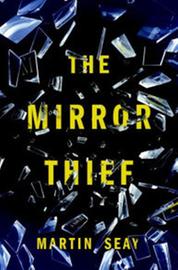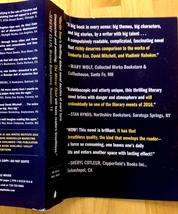"I'm Reading as Fast as I Can!" That was the title of a blog post I wrote during the winter of 2005 as I considered the deluge of advance reader's copies that arrived daily at the bookstore where I worked at the time. I am in the book trade because I love it. I read books because, well, I have to, in every sense of the word. The question is: Why do I choose to read this ARC and not that one?

|

|
The answer is complicated, but I can tell you precisely why I knew I would read Martin Seay's debut novel The Mirror Thief (Melville House, May) when an ARC showed up at my door in the fall. The book's jacket--front cover, back cover, even spine--was drenched in smart blurbs from independent booksellers. I've been opening ARC packages for decades, but that presentation stopped me in my tracks. "You've got to read this!" a dozen booksellers I know and respect were all saying.
And so I did. The novel is as extraordinary as they promised, but that's another conversation. What I really wanted to know was how Melville House came up with the cover idea. So I asked.
"I was trying to make a statement about the business, as well as trying to find the best way to market a really great book," said Dennis Johnson, Melville House co-publisher with Valerie Merians. "The urge to make a statement was prompted, in part, from the frustration that Valerie and I feel about the way the marketplace has become increasingly dominated by historically giant players. It's always been thus, of course, but it's at an historic extreme nowadays, and it's very hard for smaller indie players to participate in that kind of marketplace. The bitter irony, of course, is that the system needs us both--indie booksellers for showrooms and handselling leadership, and indie publishers because, well, culture does not live by generic bestsellers alone."
Last winter, Johnson was exploring possibilities for a campaign to highlight that dilemma, as well as "do something that would remind indie publishers and retailers that we are the most natural partners in the literary ecosystem. As more than half our staff--myself included--have worked in bookstores, Melville House has always published books that resonate most profoundly with the business of indie booksellers, so I guess I was trying to imagine a roots campaign of some sort."
 |
|
| Dennis Johnson | |
During ABA's 2015 Winter Institute in Asheville, he had what he described as a "eureka moment" while reading the manuscript of a debut novel "that was making my publisher's antenna vibrate like crazy--a big, fat, page-turner that was part literary thriller and part historical suspense novel, the kind of sweeping saga you stay up all night to finish. It was called The Mirror Thief, and it reminded me of when I discovered another big, fat saga (and the biggest selling book in Melville House's history): Hans Fallada's Every Man Dies Alone."
The Mirror Thief turned out to be the perfect book for the campaign he'd been envisioning "because this was the kind of book that indie booksellers could sell like no one else could," Johnson said, describing his right-place-right-time moment of clarity: "And then of course I just looked around me and the eureka moment turned into a Homer Simpson moment, whereby you slap your forehead and say, 'D'oh!' All these booksellers were walking around the hotel with book bags of ARCs and with manuscripts jammed under their arms and it came to me. If the book represented both what indie booksellers do better than anyone else, and what we do as indie publishers, why not really brand it as such, and build the campaign for it based on what indie booksellers had to say about it?"
The cover Melville House subsequently created for The Mirror Thief's ARC features blurbs from Mary Wolf of Collected Works Bookstore & Coffeehouse, Stan Hynds of the Northshire Bookstore, Sheryl Cotleur of Copperfield's Books, Jeremy Ellis of Brazos Bookstore, Kevin Elliott of 57th Street Books, Steve Salardino of Skylight Books, Anmiryam Budner of Main Point Books, Ed Conklin of Chaucer's Bookstore, Chris Phipps of DIESEL, a Bookstore, Geoffrey Jennings of Rainy Day Books, Peter Matyskiela of the Doylestown Bookshop and Greg Berry of the Elliott Bay Book Co.
"At Winter Institute 10, watching booksellers walk around with the thousand-page manuscript for [Garth Risk Hallberg's] City On Fire and more, I realized again how open indie bookstore buyers are to things other buyers aren't--debuts, long books, literary novels, writers from outside the echo chamber," Johnson recalled. "I knew I could get many of them to hear me out and give it a read. And I knew the book was so good that they'd love it, and that would be the start of a buzz campaign. And I wanted to print the buzz--it came to me that I should make a galley that had nothing on the cover--not even the title--except what indie booksellers said about it.
"So that's what we did. Statement made." --Robert Gray, contributing editor (column archives available at Fresh Eyes Now)

